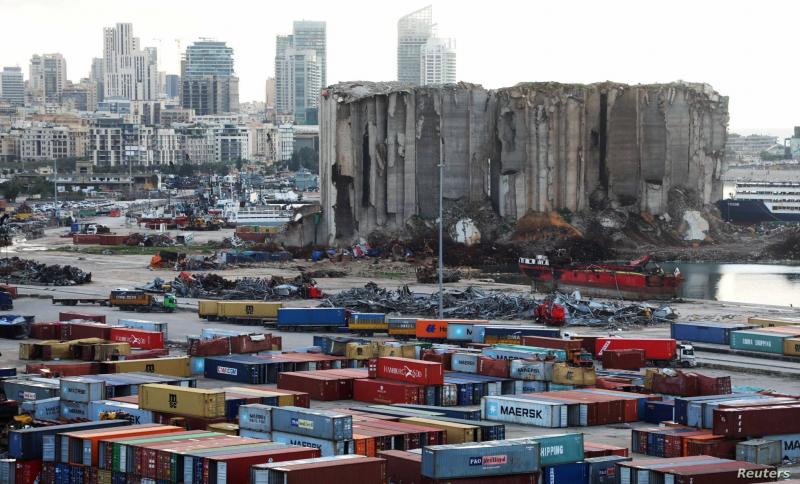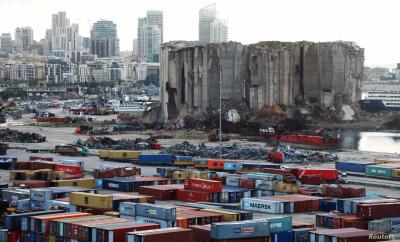The Minister of Agriculture in the caretaker government, Dr. Abbas Haj Hassan, inaugurated the veterinary and agricultural quarantine center at the Port of Beirut, in the presence of the Ministers of Public Works and Transportation, Dr. Ali Hamiyeh, and the Minister of Economy and Trade, Amin Salam, along with the Japanese Ambassador Takeshi Akubo, and the Director of the World Food Program, Dr. Abdullah al-Wardat.
In his speech, the Minister of Agriculture welcomed attendees in the Port of Beirut, which he described as part of the city's memory that has endured hardships since the Civil War, through the wars with the Israeli enemy, up to the catastrophic explosion that marred the face of the city and all the nation.
He said, "Welcome to this place, which we consider to be our gateway to the world. Restoring it and bringing life and activity back to it is just breathing life into an entire nation."
He added, "Today, we inaugurate this edifice that is cared for by the Ministry of Agriculture after great effort and with the blessing of the Japanese government and its generous assistance, under the sponsorship, following, and support of the World Food Program, represented by Dr. Abdullah al-Wardat. I also extend my thanks to the hosts, meaning the Ministry of Public Works and Transportation."
He continued, "This public facility is essential to our economic movement in all its branches and represents a promising start towards establishing a quarantine and veterinary center at all borders—land, sea, and air—confirming our commitment to all international treaties and agreements that emphasize the necessity of ensuring product quality and safety in appreciation of our brotherly and friendly countries."
He remarked, "Allow me to take this opportunity today to affirm to you and to the entire Arab, Islamic, European, and Western world that Lebanon wants its reciprocal relations, both in agricultural and animal production, to be the best with its close and distant surroundings. The tests we conduct for the entry of any product or type are the first step, and what we also do in testing our exports is fundamental in shaping this product’s image and its competitiveness and safety for consumers in any part of the world."
He addressed the donor parties: "Yes, gentlemen, the contributions made by the Japanese government today are appreciated and what the World Food Program has provided is just a glimpse of what is possible. The hope we have is to forge a partnership with Lebanon's friends to build a robust economy that relies on agriculture and industry for a better tomorrow, incorporating the latest technologies and guarantees of product safety for local and global consumption."
He thanked Japan for its confidence, love, and support that "will not be limited to this center located in the heart of the Port of Beirut, but will extend from the heights of Akkar along the coastal strip to Hasbaya, the Beqaa Valley, and Baalbek-Hermel."
He added, "These areas and their people thank you and assure you that we commit to building our country and creating a solid trust between us and the entire world, as we believe in dialogue and partnership and uphold our rights, which we will never relinquish by land or sea."
He continued, "Since we are keen on achieving all constitutional entitlements that our people need, we affirm that everyone is responsible internally for speeding up the fulfillment of these entitlements and facilitating the formation of a government to set our nation on the right track." He concluded, "Looking forward to a new date and a new partnership aimed at building the human being and revitalizing this nation."
For his part, Minister Hamiyeh said, "What the Port of Beirut faced on August 4 was a disaster in every sense of the word, yet the will of the Lebanese people is stronger than all disasters," describing the port's activity post-disaster as poor, where only three out of 16 cranes were operational and the movement was almost non-existent. However, he noted that today there are an additional 11 cranes, with eight cranes operating full-time, and that port revenues have begun to rise.
He added, "When we talk about state facility revenues, it means strengthening one of the elements of power in any country in the world. Thus, activating public facilities and increasing their revenues is one of the fundamental pillars for making sound decisions at the state level." He pointed out that "the general strategic plan for the port and the preparation of the new legal framework for the port sector throughout Lebanon, from northern to southern borders, are nearing completion, and the new legal framework will consider partnership with the private sector. We are advocates of attracting investments to this sector," noting that "this does not mean that the private sector will invest government funds, also known here as 'contractor,' but rather that they will invest their own money."
He added, "We are ready within the framework of this law, and after its approval by Parliament, which we have been working on for six months, to have 100 percent operational engagement from the private sector. There is no problem with that," confirming that "there will be no sale of state property whatsoever, and thus the infrastructure and port sector will remain the exclusive property of the state."
He stated, "Regarding the reconstruction of the Port of Beirut, we will finalize the strategic plan by the end of next August, aiming for the optimal investment of every square meter of its land." He reminded that the Port of Beirut "occupies a strategic and geographical location on the eastern shore of the Mediterranean Sea, serving as the gateway from East to West, and its competitive role against its peers on the eastern Mediterranean coast cannot be forfeited," adding that "all services previously utilized, including imports, exports, marine agencies, and individual services, will be included within a unified building in the new strategic plan, as evidenced by what we see today regarding the building belonging to the Ministry of Agriculture concerned with food safety and agriculture."
He concluded, "We will begin the reconstruction of the port first, through the legal framework and we'll implement small projects within it. We welcome all countries of the world to invest in it, except for the Israeli enemy. The port will not be monopolized by any country or company but will remain the property of the Lebanese people, with our affirmation that the Lebanese state is always in the process of activating relations with all countries of the world under the auspices of sovereignty and the pure interests of the Lebanese people. We will provide two or three months for companies and interested parties in its reconstruction, and if there is no interest, we assure you that we will not keep the port hostage to global tensions, and we declare here that our decisive decision will be to rebuild it using its revenues, which are gradually increasing in financial value."




